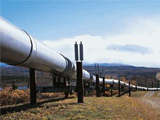|
|
TODAY.AZ / Business
Perspectives and advantages of new oil refinery in Ceyhan Port
18 January 2007 [17:31] - TODAY.AZ

The SOCAR President said that oil output peaked in Azerbaijan during the last ten months.
"Oil production will hit 60m tonnes by 2010. The SOCAR affords to make investment in oil sector of any country. Turkey is the third one," he said.
Erdal Aksoy said that SOCAR & Turcas Energy JV will be engaged in implementation of the project on establishment of an Oil Refinery in the Ceyhan Port at an annual capacity of 10m-20m tons, and marketing of transportation of Shah Deniz gas to Turkey and Europe.
"We plan to build a refinery worth US$1 billion within 4 or 5 years. We will expand its capacity from 10 million tonnes to 20m later," he said.
The SOCAR (51%) and Turcas (49%) will make joint investment in construction of the refinery. Turcas has a 51% stake in marketing of Azeri gas.
As APA reports, there are two oil refineries in Azerbaijan at annual capacity of 22 million tonnes. It may seem it is unnecessary to make so much investment in construction of another refinery in the Ceyhan Port. However, some factors make it profitable. Truly, the capacity of local refineries could be expanded, but the oil processing doesn't meet international standards at these refineries.
Even if the local refineries meet international standards, for Azerbaijan it is not as economically favorable to export refined oil as crude oil. The main market is Georgia while some part of oil is exported to Iran. Transport potential is limited. Azerbaijan exports oil to Georgia via railway which is expensive.
As to the low-cost sea way, oil can only be exported to Iran as other Caspian states don’t need Azeri oil. It is impossible to expand routes via the Caspian as the way crosses through Volga-Don which is expensive and needs permission of Russia.
In this context, construction of an oil refinery in the Ceyhan Port must be advantageous.
As we know, the annual capacity of the BTC is 50m tonnes. Kazakhstan is not ruled out to send its oil via this pipeline. So, the capacity of the BTC will be expanded to 70m to 80m tonnes. That is to say the refinery in the Ceyhan Port will never be Hungary for crude oil. The Ceyhan Port is deigned to load huge tankers and that is a good infrastructure. The geography of export will be enlarged on the Mediterranean Sea. The Ceyhan oil will be transported to Europe and Iran.
Despite big output, oil-rich Iran wants for oil for the domestic market. It pays some $ billion for oil every year as its refineries are unable to process enough oil.
Moreover, Turkish market is that prospective. This country consumes some 20m tons of oil products, of which 70% is diesel fuel, the rest is fuel oil, only a little amount of gasoline.
The high-tech refinery in the Ceyhan will produce high-standard oil. The processed depth of oil is also significant. The depth is 50% to 60% in Baku Refinery today. The depth is 85% to 90% in high-tech refineries which are more economical.
The Ceyhan Refinery will also be able to refine oil pumped from Russia's Novorossiysk part.
As seen, the project is mutually beneficial for Turkey and Azerbaijan.
However, some experts consider such large-scale project risky as it requires long-term and extremely much capital. The investment will be at least $5 billion and in up-to seven-year period.
Also, fall-and-rise conjecture can cause instability on the oil market.
URL: http://www.today.az/news/business/35117.html
 Print version
Print version
Connect with us. Get latest news and updates.
See Also
- 25 April 2025 [19:00]
Private sector makes up 83% of GDP, says Deputy Minister - 25 April 2025 [15:39]
Deputy Minister highlights digital economy and Alat Free Economic Zone at Conference - 25 April 2025 [14:55]
Focus on Garabagh and sustainability at upcoming Baku Forum - 25 April 2025 [14:31]
ASCO hosts MEPC 83 Seminar on maritime emissions and sustainability - 24 April 2025 [15:49]
Azerbaijan, ADB discuss development priorities for next four years - 24 April 2025 [12:55]
Azerbaijan achieves major milestones in ICT development, boosts cybersecurity and talent - 24 April 2025 [11:00]
Azerbaijan’s banks shielded from US tariff impact, Fitch reports - 23 April 2025 [18:59]
CBA Governor explains impact of rising interest rates and liquidity on lending and deposits - 23 April 2025 [17:18]
Kazakhstan plans to boost oil exports from Azerbaijan with focus on environmental responsibility - 23 April 2025 [15:27]
Middle Corridor project progresses, Kazakhstan-Azerbaijan cooperation strengthens
Most Popular
 Azerbaijan and China sign mutual visa exemption agreement for ordinary passport holders
Azerbaijan and China sign mutual visa exemption agreement for ordinary passport holders
 Turkiye opens new chapter in space with TÜRKSAT 6A
Turkiye opens new chapter in space with TÜRKSAT 6A
 Khankendi to host 17th Economic Cooperation Organization Summit
Khankendi to host 17th Economic Cooperation Organization Summit
 Armenia's accusations are misinformation, says Azerbaijani Defense Ministry
Armenia's accusations are misinformation, says Azerbaijani Defense Ministry
 Euroashiotics: Metamorphoses of the EU Mission in Armenia
Euroashiotics: Metamorphoses of the EU Mission in Armenia
 First Indonesian Hajj pilgrims to reach Saudi Arabia next week
First Indonesian Hajj pilgrims to reach Saudi Arabia next week
 President Ilham Aliyev visited Monument to the People's Heroes in Beijing
President Ilham Aliyev visited Monument to the People's Heroes in Beijing
